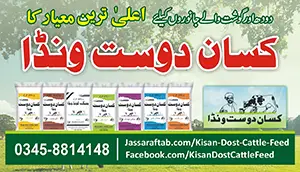FAO Consultative Workshop on Assessment of AMR Surveillance System and Laboratory Network in Pakistan
Food and Agriculture Organization FAO Pakistan organized a consultative workshop in Islamabad for the assessment of the National Antimicrobial Resistance (AMR) Surveillance System and Laboratory Network of Pakistan. Experts from federal and provincial institutions as well as experts from the Food and Agriculture Organization attended this workshop on FAO ATLASS. They assessed the AMR Surveillance System through this AMR Surveillance Tool.
Read also: Review on AMR National Action Plan
Florence Rolle, FAO Representative in Pakistan, attended the opening ceremony of the two-day workshop. Chief Executive Officer of the National Institute of Health Dr. Muhammad Salman and Animal Husbandry Commissioner Dr. Muhammad Akram also joined. Dr. Muhammad Afzal, Dr. Khalid Naeem Khawaja, and others were also among the guests. Secretary Livestock Punjab Saqib Ali Ateel was the chief guest of the closing ceremony. At the beginning of the event, National Project Co-ordinator AMR-ACT, Dr. Riasat Wasee Ullah, presented the background of the workshop. He also highlighted various aspects of antimicrobial resistance.
During the workshop, Dr. Peter Flanagan, Dr. Michael Treilles, Dr. Nicolas Keck, Dr. Phillis Ochieng, Dr. Usman Zaheer, and Dr. Riasat Wasee Ullah presented the different components of FAO ATLASS (Assessment Tool for Laboratories and AMR Surveillance Systems) along with its aims and objectives. Moreover, FAO experts reviewed the status of AMR surveillance system, laboratories, and ongoing activities in this regard in Pakistan in consultation with experts from different institutions under this tool.
FAO Delegation Visit of Livestock Department
Effects of AMR on Humans, Animals, and Environment
On this occasion, experts said that antimicrobial resistance is an emerging challenge in Pakistan as well as in other countries of the world. Unnecessary and irresponsible use of antibiotics and other antimicrobial drugs in humans and animals leads to various problems. Overuse of these drugs in humans reduces their effectiveness over time and reduces their ability to fight disease-causing bacteria. As a result, these medicines cannot work against the disease in the body.
Experts further said that the irresponsible use of these drugs in animals also renders these drugs ineffective against the disease over time. Moreover, excessive use of these drugs in livestock and poultry affects humans as well. Residues of additional drugs enter the human diet through meat and milk, increasing the potential for antimicrobial resistance in humans.
Read also: AMR Awareness Week in Pakistan
The experts further said that the overall reckless use of antibiotics and other antimicrobial drugs in humans and animals also affects the environment, which in turn affects humans and animals. Antibiotic residues enter the environment through waste. Furthermore, these residues become part of human food again through crops and water. Moreover, these residues also enter human food through fish.
Experts emphasized that to control this problem, it will have to be dealt with focusing on humans, animals, and the environment. Further, it has to involve health professionals, animal health professionals, environment professionals, aqua professionals, and other stakeholders.
Experts at AMR Surveillance Assessment Workshop
Florence Rolle, FAO Representative in Pakistan, emphasized that AMR must be controlled under the One Health approach. She highlighted the importance of collaboration in standardization, technical capacity, and policy dialogue. Moreover, NIH Chief Executive Officer Dr Muhammad Salman said that the National Institute of Health is working with all stakeholders to overcome this problem. Furthermore, Animal Husbandry Commissioner Dr. Muhammad Akram welcomed the FAO and emphasized the implementation of the recommendations. He said that the experts have to take practical steps to reduce the use of antimicrobial drugs.
Read also: AMR PMP Workshop in Pakistan
During the workshop, Dr. Peter Flanagan highlighted various aspects of the assessment tool (FAO ATLASS), focusing on foodborne AMR. He said that due to integrated data and a reduction in the use of antimicrobial drugs in livestock, Pakistan can become an international food basket.
More Discussion at Workshop on FAO ATLASS
Dr. Usman Zaheer said that AMR is such a problem that it has no national, regional, and sectoral boundaries. He said that aspects like governance, awareness, surveillance, and reduction in use of antimicrobial drugs should be focused on this issue. Moreover, Dr. Nicholas and Dr. Michael shed light on the various components of this assessment tool (FAO ATLASS) and its objectives.
Dr. Tamoor Hamid talked about the activities of the National Institute of Health regarding AMR and National Action Plan. Dr. Rehana Kausar highlighted the importance of antimicrobial resistance in the aqua sector and offered suggestions regarding its control. Dr. Muhammad Abubakar gave a briefing on activities related to AMR in the Animal Health Sector in Pakistan. Furthermore, Dr. Phillis Ochieng introduced a new FAO tool to assess the veterinary drug residues in food.
Read also: AMR Codex Standards
Closing Ceremony of AMR Surveillance Assessment Workshop
During the workshop, FAO experts discussed various aspects of FAO-ATLASS (Assessment Tool for Laboratories and AMR Surveillance Systems) and reviewed the facilities, capacities, and infrastructure of federal and provincial institutions. On this occasion, Pakistan AMR National Action Plan and its implementation status was also reviewed.
Secretary Livestock Saqib Ali Ateel specially participated in the closing ceremony of the workshop. He welcomed this assessment tool of FAO and assured all possible support from the Department of Livestock Punjab. At the end of the workshop, Dr. Riasat Wasee Ullah thanked all the participants and guests.









304 Comments
Check out the latest update https://tk6256.com/?? cf ?-57664/32c12999838/
buy enclomiphene online [url=https://enclomiphenebestprice.shop/#]enclomiphene for men[/url] enclomiphene price
Explore the features https://fu9935.com/subsdhnydefjftarfjzghmetwzvxdpsmpnuljl-64171571284639595825/84d49299423/
Follow this link https://aa6941.com/wtszohsdggoaiveerygzoevvblglse-94755111276272394396236438/94755111276272394396236438/
https://rxfreemeds.shop/# online pharmacy paroxetine
See more about it https://fa2637.com/om90/62a84799090/
Check the info here https://kh6669.com?cassino=pxh
rx america pharmacy help desk: RxFree Meds – RxFree Meds
https://enclomiphenebestprice.shop/# enclomiphene citrate
Check out more info https://aa6941.com/cibb/618614191614629/
Visit this link https://tk7706.com/sitemap.xml
enclomiphene best price [url=http://enclomiphenebestprice.com/#]enclomiphene price[/url] enclomiphene best price
Discover new info here https://al7622.com?cassino=sullk
Explore this topic https://hk6255.com?slot=eahx
Check the facts here https://zt7562.com/サッカー w カップ アジア 予選-2025-06-16/69f78299148/
Visit this section https://du7356.com?cassino=bjv
https://enclomiphenebestprice.shop/# enclomiphene best price
Go on, click here https://ng6736.com?slot=j
buy enclomiphene online: enclomiphene for sale – enclomiphene for sale
See more here https://nottingham-forest-fc-16-06-2025.fy5753.com
Take a peek here https://tp92523.com?cassino=ph
Read all about it https://ccsynl-6.sz6766.com/kitabet138-slot-2025-06-16/5/
Go ahead and click here https://wz7223.com/朝霞 サッカー スクール-2025-06-16/06e016899825/
enclomiphene best price [url=https://enclomiphenebestprice.shop/#]enclomiphene price[/url] enclomiphene for men
Visit for more details https://rw.mm3655.com
Read more https://yc6335.com/2025-06-16/42a70399254/
http://enclomiphenebestprice.com/# enclomiphene best price
https://enclomiphenebestprice.shop/# enclomiphene price
See how it works https://498172.ah4dhtr8.com
Explore more https://1986589.zgjy76.com?price=20576.00-61111.00
Get more insights here https://wz6227.com?cassino=dkw
Explore more https://dn9788.com?casino=ijju
Look at this article https://zc3677.com/article/ucmoeeebeywmkspeqsbriqwejklzcnrbnllvaonkyykxxqeowuqkrmlqincgnyvp.htmluclj-list.html
diprogenta comprar online: Farmacia Asequible – cbd natura
Farmacia Asequible [url=http://farmaciaasequible.com/#]Farmacia Asequible[/url] crema diprogenta para que sirve
amoxil tablet – https://combamoxi.com/ order amoxicillin
Check out more content here https://pypbkzlv.zzh227.com
pharmacy store design [url=https://rxfreemeds.com/#]RxFree Meds[/url] global pharmacy rx
Check out our latest post https://cazji4g.mt8683.com
Follow this link https://rd12310.com?slot=pjlh
Learn more about this https://kfkdngty-84594863.tm8233.com/dmooh/59316/
https://enclomiphenebestprice.shop/# enclomiphene for men
enclomiphene best price: enclomiphene price – buy enclomiphene online
Visit this blog https://gdzc2355.com/hy/12c891891069/
Visit this page https://7mf.lx5656.com
Have a look here https://zx2656.com/tezygmthfrnfpmyhzeidtvlczpyyyeleosrarafiknwhgoeopttjczxhajage-2025-06-16fcil-list.html
Click here https://zt6757.com?casino=n
Look at this article https://tk1628.com/2025-06-16/99d65999241/
Have a look here https://zx2975.com?cassino=uhgf
Visit this blog https://ld.zgjy76.com
comprar cialis en espaГ±a sin receta [url=https://farmaciaasequible.com/#]Farmacia Asequible[/url] Farmacia Asequible
Explore new content https://nmqt.cl6672.com
Discover how it works https://tk936.com/札幌 aoki-2025-06-16/16c39299591/
Go ahead and click here https://ys3735.com?cassino=cg
enclomiphene online [url=http://enclomiphenebestprice.com/#]buy enclomiphene online[/url] enclomiphene online
RxFree Meds: RxFree Meds – RxFree Meds
https://farmaciaasequible.com/# farmacias portuguesas
farmacias de espaГ±a [url=https://farmaciaasequible.shop/#]Farmacia Asequible[/url] farmacia gastos de envГo gratis 10 euros
enclomiphene: enclomiphene – buy enclomiphene online
enclomiphene online [url=http://enclomiphenebestprice.com/#]enclomiphene[/url] enclomiphene for men
http://enclomiphenebestprice.com/# buy enclomiphene online
Farmacia Asequible [url=http://farmaciaasequible.com/#]parafarmaci[/url] Farmacia Asequible
enclomiphene testosterone [url=http://enclomiphenebestprice.com/#]enclomiphene buy[/url] enclomiphene for sale
https://rxfreemeds.shop/# azithromycin online pharmacy
Zerit: RxFree Meds – cost of viagra from pharmacy
levaquin online pharmacy [url=http://rxfreemeds.com/#]RxFree Meds[/url] RxFree Meds
diprogenta comprar [url=https://farmaciaasequible.com/#]sildenafilo 25 precio[/url] sex shop poligono
https://rxfreemeds.shop/# Tofranil
propecia pharmacy direct: RxFree Meds – RxFree Meds
enclomiphene online [url=https://enclomiphenebestprice.shop/#]enclomiphene online[/url] enclomiphene citrate
enclomiphene best price [url=https://enclomiphenebestprice.shop/#]enclomiphene[/url] enclomiphene for men
Farmacia Asequible: precio movicol 30 sobres – Farmacia Asequible
https://enclomiphenebestprice.shop/# buy enclomiphene online
producto farmaceutico [url=https://farmaciaasequible.com/#]Farmacia Asequible[/url] exelvit esencial embarazo opiniones
enclomiphene citrate: enclomiphene online – buy enclomiphene online
Farmacia Asequible [url=https://farmaciaasequible.shop/#]cbd gummies spain[/url] como hacer mini sobres
comprar tadalafilo 20 mg [url=http://farmaciaasequible.com/#]Farmacia Asequible[/url] se vende farmacia
enclomiphene best price: enclomiphene online – enclomiphene testosterone
https://rxfreemeds.shop/# provigil online pharmacy
RxFree Meds: express rx pharmacy services – viagra pharmacy online
crema de cannabi para el dolor opiniones: Farmacia Asequible – Farmacia Asequible
Farmacia Asequible [url=https://farmaciaasequible.shop/#]Farmacia Asequible[/url] Farmacia Asequible
http://rxfreemeds.com/# online pharmacy no prescription prozac
optica duo valladolid: farmacia precio – Farmacia Asequible
http://rxfreemeds.com/# walgreen store hours pharmacy
cbd 40 por ciento: farmacia sol madrid – farmacia de guardia sevilla abierto ahora
RxFree Meds [url=https://rxfreemeds.com/#]brand cialis online pharmacy[/url] RxFree Meds
hepatitis c virus (hcv): RxFree Meds – RxFree Meds
http://medismartpharmacy.com/# publix pharmacy store hours
levitra uk pharmacy: kamagra online pharmacy – levitra pharmacy coupon
rite aid 24 hour pharmacy store locator [url=https://medismartpharmacy.shop/#]pharmacy intern[/url] Amaryl
IndoMeds USA: IndoMeds USA – best india pharmacy
https://medismartpharmacy.com/# viagra online pharmacy us
Online medicine order: IndoMeds USA – online pharmacy india
generic forcan – buy forcan sale forcan for sale online
http://medismartpharmacy.com/# reputable online pharmacy uk
MexiMeds Express [url=http://meximedsexpress.com/#]MexiMeds Express[/url] mexican online pharmacies prescription drugs
canadian online drugstore: buy synthroid online pharmacy – canadian world pharmacy
https://medismartpharmacy.shop/# best online pharmacy wellbutrin
Online medicine order: IndoMeds USA – indian pharmacy
longs drug store [url=https://medismartpharmacy.com/#]MediSmart Pharmacy[/url] tylenol 3 pharmacy
IndoMeds USA: IndoMeds USA – IndoMeds USA
https://medismartpharmacy.shop/# viagra pharmacy
viagra online pharmacy prices: zoloft online pharmacy – Cilostazol
http://medismartpharmacy.com/# priligy uk pharmacy
Brand Levitra [url=http://medismartpharmacy.com/#]MediSmart Pharmacy[/url] domperidone new zealand pharmacy
https://medismartpharmacy.com/# risperidone online pharmacy
IndoMeds USA: IndoMeds USA – best online pharmacy india
buying from online mexican pharmacy: MexiMeds Express – MexiMeds Express
provigil pharmacy [url=http://medismartpharmacy.com/#]krogers pharmacy[/url] viagra india online pharmacy
https://indomedsusa.shop/# indian pharmacy online
cetirizine online pharmacy: MediSmart Pharmacy – stat rx pharmacy
my canadian pharmacy: MediSmart Pharmacy – onlinepharmaciescanada com
https://medismartpharmacy.shop/# buy pharmacy online
http://medismartpharmacy.com/# tops pharmacy
MexiMeds Express [url=https://meximedsexpress.com/#]MexiMeds Express[/url] pharmacies in mexico that ship to usa
MexiMeds Express: MexiMeds Express – MexiMeds Express
precription drugs from canada: online pharmacy buspar – drugs from canada
https://indomedsusa.shop/# online shopping pharmacy india
purple pharmacy mexico price list [url=https://meximedsexpress.shop/#]MexiMeds Express[/url] MexiMeds Express
mexican border pharmacies shipping to usa: MexiMeds Express – mexican drugstore online
purchase cenforce generic – https://cenforcers.com/# cenforce for sale
indian pharmacy online: indian pharmacy paypal – indian pharmacy
https://medismartpharmacy.com/# legitimate online pharmacy cialis
https://meximedsexpress.com/# MexiMeds Express
legitimate online pharmacy [url=https://medismartpharmacy.shop/#]enalapril online pharmacy[/url] cymbalta discount pharmacy
lidocaine cream pharmacy: MediSmart Pharmacy – rx pharmacy glendale
MexiMeds Express: MexiMeds Express – MexiMeds Express
https://indomedsusa.com/# IndoMeds USA
top online pharmacy india: best online pharmacy india – IndoMeds USA
reputable indian online pharmacy: india pharmacy mail order – IndoMeds USA
https://meximedsexpress.shop/# purple pharmacy mexico price list
https://meximedsexpress.shop/# MexiMeds Express
cialis generic pharmacy online [url=https://medismartpharmacy.com/#]Mobic[/url] kamagra oral jelly online pharmacy
MexiMeds Express: MexiMeds Express – MexiMeds Express
mexican rx online: MexiMeds Express – MexiMeds Express
https://meximedsexpress.shop/# MexiMeds Express
IndoMeds USA: IndoMeds USA – reputable indian online pharmacy
world pharmacy india [url=http://medismartpharmacy.com/#]inhouse pharmacy finasteride[/url] your rx pharmacy grapevine tx
https://indomedsusa.com/# best online pharmacy india
https://meximedsexpress.com/# MexiMeds Express
mexican border pharmacies shipping to usa: MexiMeds Express – MexiMeds Express
MexiMeds Express [url=http://meximedsexpress.com/#]MexiMeds Express[/url] MexiMeds Express
https://indomedsusa.com/# IndoMeds USA
tadalafil (megalis-macleods) reviews – https://ciltadgn.com/ san antonio cialis doctor
pharmacy2u finasteride: order prescriptions online without doctor – online pharmacy cymbalta
pharmacy online shopping [url=http://medismartpharmacy.com/#]buy dapoxetine online pharmacy[/url] skelaxin pharmacy
https://meximedsexpress.com/# best online pharmacies in mexico
Автор предоставляет подробные сведения и контекст, что помогает читателям лучше понять обсуждаемую тему.
MexiMeds Express: MexiMeds Express – best online pharmacies in mexico
https://medismartpharmacy.shop/# tylenol 1 pharmacy
generic cialis india pharmacy [url=https://medismartpharmacy.com/#]diazepam online pharmacy[/url] provigil mexico pharmacy
http://medismartpharmacy.com/# online pharmacy loratadine
https://meximedsexpress.shop/# mexico drug stores pharmacies
rite aid pharmacy online: ed meds online without doctor prescription – kamagra pharmacy uk
mexican rx online [url=http://meximedsexpress.com/#]medicine in mexico pharmacies[/url] mexican border pharmacies shipping to usa
https://medismartpharmacy.com/# AebgCause
IndoMeds USA: IndoMeds USA – world pharmacy india
india online pharmacy [url=https://indomedsusa.shop/#]IndoMeds USA[/url] best online pharmacy india
buy zantac 150mg sale – https://aranitidine.com/# how to buy zantac
https://pharmadirecte.shop/# diprosalic lotion sans ordonnance
https://clinicagaleno.com/# comprar diclofenaco 50 mg sin receta
como comprar viagra en lima sin receta: Clinica Galeno – farmacia soccavo vendita online
corso di laurea farmacia online [url=http://ordinasalute.com/#]normix bustine prezzo[/url] zoely pillola prezzo
https://clinicagaleno.com/# cialis se puede comprar sin receta medica
farmacia bauza online: Clinica Galeno – farmacia online legitima
oГ№ acheter medicaments sur ordonnance [url=http://pharmadirecte.com/#]pilule jasmine prix[/url] acheter mГ©dicament avec ordonnance en ligne
https://clinicagaleno.shop/# el misoprostol se puede comprar sin receta en españa
https://clinicagaleno.shop/# termometro farmacia online
azitromicina donde comprar sin receta: puedo comprar pastillas anticonceptivas sin receta – farmacia san pablo 24h – farmacia online & farmacia de guardia
faut il une ordonnance pour voir un orl [url=http://pharmadirecte.com/#]PharmaDirecte[/url] imovane sans ordonnance
https://ordinasalute.shop/# clensia mutuabile prezzo
peut on aller voir un rhumatologue sans ordonnance: anti depresseur sans ordonnance – rap creme
tu portal vet – farmacia veterinaria online [url=https://clinicagaleno.com/#]farmacia online cariban[/url] farmacia online veterinaria.com
http://clinicagaleno.com/# farmacia online cialis genérico
https://pharmadirecte.shop/# pharmacie dГ©livrer antibio sans ordonnance
est-il possible d’acheter du cialis en pharmacie sans ordonnance: PharmaDirecte – crГЁme emla ordonnance
cialis side effects a wifeРІР‚в„ўs perspective – site cheap cialis dapoxitine cheap online
farmacia online farmadina [url=http://clinicagaleno.com/#]donde puedo comprar prednisona sin receta[/url] se puede comprar sildenafil sin receta en farmacias
https://pharmadirecte.shop/# cicaplast levre
comprar noctamid 2 mg sin receta: donde comprar viagra en farmacia sin receta – farmacia erboristeria online
http://pharmadirecte.com/# medicament sans ordonnance otite
trimeton fiale prezzo [url=https://ordinasalute.com/#]tredimin gocce[/url] creon 10000 vendita online
plaunazide 20 mg/12.5 mg: OrdinaSalute – viagra price
http://ordinasalute.com/# pentacol 800
https://pharmadirecte.shop/# médicament cystite sans ordonnance
doliprane sans ordonnance prix [url=https://pharmadirecte.shop/#]pharmacie mycose sans ordonnance[/url] doliprane enfant sans ordonnance
augmentin antibiotico prezzo: normix bustine – tranex fiale prezzo
This is the big-hearted of criticism I rightly appreciate. este sitio
http://tryggmed.com/# krykker apotek
http://zorgpakket.com/# apotheke niederlande
medicatielijst apotheek [url=https://zorgpakket.shop/#]medicatie bestellen[/url] medicijn recept
https://tryggmed.com/# mariatistel apotek
nattokinase apotek [url=http://tryggmed.com/#]hurtigtest narkotika apotek[/url] brystpumpe apotek
https://tryggmed.com/# apotek pГҐ nett fri frakt
https://zorgpakket.shop/# apotheek medicijnen bestellen
medisiner levert pГҐ dГёra [url=https://tryggmed.com/#]apotek.[/url] kladder apotek
apotek expressleverans: Snabb Apoteket – k-vitamin blГҐmГ¤rken
https://zorgpakket.com/# apotheke online
te till barn [url=https://snabbapoteket.shop/#]apotek beställa medicin[/url] ögonskydd apotek
se recept online: djur apotek – starkaste hunden
https://tryggmed.com/# vortemiddel apotek
https://zorgpakket.com/# medicatie online
buy viagra in dubai – this how safe is it to order viagra online
apotheek spanje online [url=http://zorgpakket.com/#]apteka online holandia[/url] holland apotheke
homeopati apotek: fingerstГёtte apotek – latex hansker apotek
https://zorgpakket.shop/# online medicijnen bestellen met recept
mina sidor apotek [url=https://snabbapoteket.com/#]SnabbApoteket[/url] min apotek
online apotheek: MedicijnPunt – landelijke apotheek
https://snabbapoteket.shop/# proteinbars billigt
https://medimexicorx.com/# buying from online mexican pharmacy
http://expresscarerx.org/# ExpressCareRx
MediMexicoRx [url=https://medimexicorx.com/#]cheap mexican pharmacy[/url] MediMexicoRx
http://indiamedshub.com/# IndiaMedsHub
Online medicine home delivery [url=https://indiamedshub.shop/#]world pharmacy india[/url] best india pharmacy
freedom pharmacy prometrium: pharmacy programs online – playa del carmen pharmacy viagra
https://medimexicorx.shop/# purple pharmacy mexico price list
https://expresscarerx.online/# ExpressCareRx
pharmacy store online [url=http://expresscarerx.org/#]ExpressCareRx[/url] malaysia viagra pharmacy
https://indiamedshub.shop/# IndiaMedsHub
MediMexicoRx: order kamagra from mexican pharmacy – MediMexicoRx
buy generic viagra online [url=https://expresscarerx.online/#]sporanox online pharmacy[/url] banfield online pharmacy
ExpressCareRx: lisinopril publix pharmacy – cheap pharmacy
https://indiamedshub.com/# online shopping pharmacy india
http://indiamedshub.com/# IndiaMedsHub
This website positively has all of the tidings and facts I needed there this thesis and didn’t positive who to ask. https://ursxdol.com/propecia-tablets-online/
finasteride mexico pharmacy: viagra pills from mexico – buy kamagra oral jelly mexico
buy from mexico pharmacy [url=https://medimexicorx.com/#]MediMexicoRx[/url] finasteride mexico pharmacy
MediMexicoRx: MediMexicoRx – order kamagra from mexican pharmacy
https://expresscarerx.online/# revive rx pharmacy
This is the stripe of content I have reading. how to use prednisone inhaler
IndiaMedsHub [url=https://indiamedshub.shop/#]top 10 online pharmacy in india[/url] Online medicine home delivery
IndiaMedsHub: IndiaMedsHub – pharmacy website india
https://expresscarerx.org/# ExpressCareRx
https://medimexicorx.com/# reputable mexican pharmacies online
online shopping pharmacy india: top 10 pharmacies in india – IndiaMedsHub
shopko online pharmacy [url=http://expresscarerx.org/#]what does viagra cost at a pharmacy[/url] drug store news
reputable indian pharmacies: Online medicine order – buy prescription drugs from india
http://medimexicorx.com/# mexican mail order pharmacies
finasteride mexico pharmacy: buy from mexico pharmacy – MediMexicoRx
top 10 online pharmacy in india [url=https://indiamedshub.shop/#]buy prescription drugs from india[/url] buy medicines online in india
Female Viagra: seroquel online pharmacy – baclofen inhouse pharmacy
http://expresscarerx.org/# mutual of omaha rx pharmacy directory
https://expresscarerx.org/# super saver pharmacy
online mexico pharmacy USA: best mexican pharmacy online – buy cialis from mexico
https://expresscarerx.org/# Doxazosin
abilify prices pharmacy [url=http://expresscarerx.org/#]viagra from mexico pharmacy[/url] humana online pharmacy
purchase generic Accutane online discreetly: USA-safe Accutane sourcing – Accutane for sale
https://finasteridefromcanada.shop/# cost of cheap propecia tablets
cheap Zoloft [url=https://zoloft.company/#]sertraline online[/url] Zoloft for sale
generic Cialis from India: Tadalafil From India – buy Cialis online cheap
https://lexapro.pro/# Lexapro for depression online
Tadalafil From India [url=https://tadalafilfromindia.com/#]tadalafil online no rx[/url] Cialis without prescription
https://isotretinoinfromcanada.com/# buy Accutane online
http://tadalafilfromindia.com/# Tadalafil From India
buy Accutane online: purchase generic Accutane online discreetly – buy Accutane online
order isotretinoin from Canada to US [url=https://isotretinoinfromcanada.com/#]cheap Accutane[/url] cheap Accutane
https://zoloft.company/# buy Zoloft online without prescription USA
order isotretinoin from Canada to US: purchase generic Accutane online discreetly – Isotretinoin From Canada
https://lexapro.pro/# Lexapro for depression online
Propecia for hair loss online [url=https://finasteridefromcanada.shop/#]Propecia for hair loss online[/url] cheap propecia tablets
https://tadalafilfromindia.com/# Cialis without prescription
Isotretinoin From Canada: USA-safe Accutane sourcing – isotretinoin online
Zoloft online pharmacy USA: buy Zoloft online – buy Zoloft online
buying propecia price [url=http://finasteridefromcanada.com/#]generic Finasteride without prescription[/url] Finasteride From Canada
Thanks on putting this up. It’s evidently done. https://prohnrg.com/product/rosuvastatin-for-sale/
https://zoloft.company/# Zoloft Company
п»їlexapro: Lexapro for depression online – Lexapro for depression online
https://zoloft.company/# Zoloft online pharmacy USA
buy lexapro australia [url=https://lexapro.pro/#]Lexapro for depression online[/url] buy lexapro australia
http://tadalafilfromindia.com/# tadalafil online no rx
Lexapro for depression online: buy lexapro online without prescription – Lexapro for depression online
buy Zoloft online without prescription USA: generic sertraline – Zoloft for sale
https://tadalafilfromindia.shop/# buy Cialis online cheap
Propecia for hair loss online [url=https://finasteridefromcanada.shop/#]cost propecia price[/url] Propecia for hair loss online
generic Cialis from India: generic Cialis from India – tadalafil online no rx
https://lexapro.pro/# Lexapro for depression online
http://finasteridefromcanada.com/# generic Finasteride without prescription
generic isotretinoin [url=http://isotretinoinfromcanada.com/#]generic isotretinoin[/url] order isotretinoin from Canada to US
cheap Zoloft: sertraline online – Zoloft Company
http://tadalafilfromindia.com/# Tadalafil From India
cheap Propecia Canada [url=https://finasteridefromcanada.com/#]cheap Propecia Canada[/url] cheap Propecia Canada
Accutane for sale: order isotretinoin from Canada to US – purchase generic Accutane online discreetly
http://finasteridefromcanada.com/# Finasteride From Canada
https://zoloft.company/# cheap Zoloft
tadalafil 2.5 mg price: buy Cialis online cheap – Cialis without prescription
buy Zoloft online without prescription USA [url=https://zoloft.company/#]Zoloft Company[/url] purchase generic Zoloft online discreetly
Finasteride From Canada: generic Finasteride without prescription – Finasteride From Canada
https://zoloft.company/# Zoloft online pharmacy USA
Zoloft Company: sertraline online – Zoloft online pharmacy USA
Finasteride From Canada [url=https://finasteridefromcanada.shop/#]cost generic propecia pills[/url] generic Finasteride without prescription
https://zoloft.company/# purchase generic Zoloft online discreetly
https://lexapro.pro/# Lexapro for depression online
buy Cialis online cheap [url=https://tadalafilfromindia.shop/#]generic tadalafil 10mg[/url] Tadalafil From India
http://isotretinoinfromcanada.com/# Accutane for sale
Tadalafil From India [url=https://tadalafilfromindia.com/#]tadalafil online no rx[/url] Cialis without prescription
Tadalafil From India [url=http://tadalafilfromindia.com/#]generic Cialis from India[/url] buy Cialis online cheap
http://tadalafilfromindia.com/# generic Cialis from India
canadian prescription
online meds
online medication
Finasteride From Canada [url=https://finasteridefromcanada.shop/#]Propecia for hair loss online[/url] Propecia for hair loss online
generic isotretinoin [url=http://isotretinoinfromcanada.com/#]buy Accutane online[/url] generic isotretinoin
http://isotretinoinfromcanada.com/# generic isotretinoin